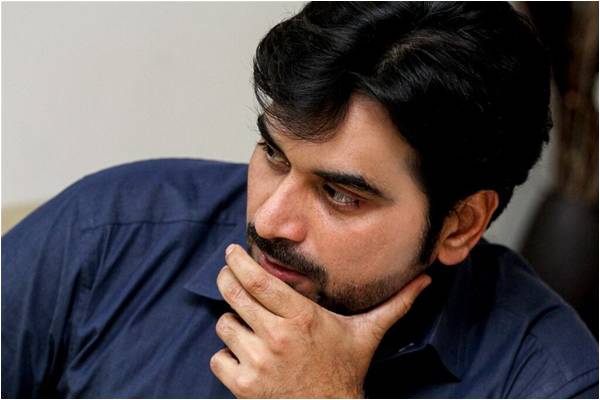
Television is decidedly less risky than cinema in Pakistan. Producing a television serial with the right cast and team is virtually a guarantee for financial success, whereas positive returns from films are a rare occurrence. Why, then, did you make the move to producing films?
I made the move because I love cinema. In fact, everyone who is making films in Pakistan today is doing so because of the passion they have for cinema and not to make money. Otherwise, there is more money and less risk in television.
Cinemas is, and has always been, my first love. When I started work on television, my plan was to move to films after doing a few serials. In fact, Sameena Peerzada cast me in her film, Inteha, after I had done just a couple of serials. The film was successful and garnered me a lot of praise but it was a bad time for Pakistani cinema. A lot of movie theaters were being shut down and the rest were in a state of disrepair. Very few films were being made. In spite of the success of my film, I did not get any offers to do good films. As a result, I continued working on television. Things started changing a few years later, when Pakistan decided to allow the exhibition of Indian films. This proved to be a boon for the film industry as it brought people back to the cinemas. As a result, a lot of new state-of-the-art movie theaters were constructed and a lot of educated and talented people started thinking about working in films. This rejuvenated environment was very heartening and I decided to make a film, Main Hoon Shahid Afridi, about the life of a cricketer. It was not a mainstream film but did very well at the box office.
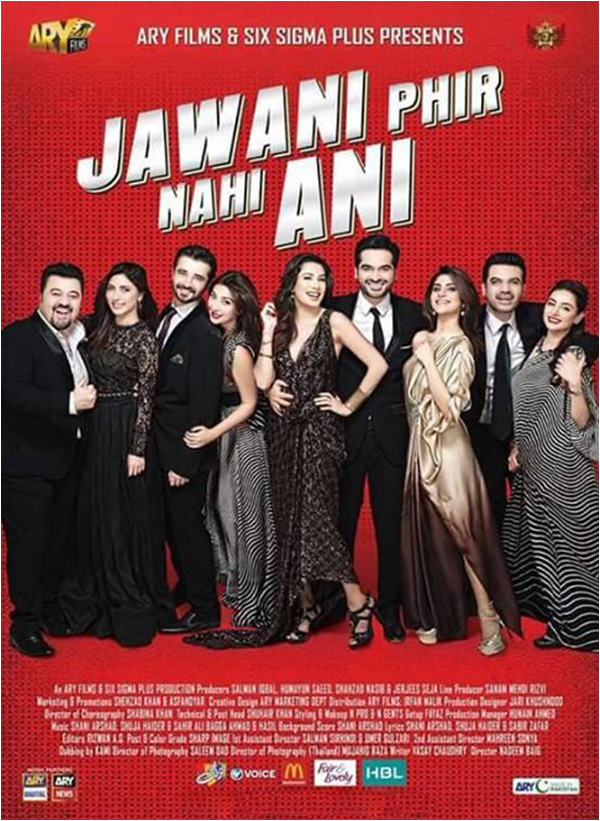
Did you make a lot of money with Main Hoon Shahid Afridi?
No, I did not. The film was officially a commercial hit but I ended up losing money.
How come?
One, I had spent a lot of money on Main Hoon Shahid Afridi because I wanted to make a film of high quality. Two, the costs of marketing, promotion and exhibition are very high in Pakistan. A film has to make a lot of money at the box office for the producer to make a profit. Fortunately, I had a couple of corporate sponsors for the film. They helped me recover my costs.
How much business does a film need to do to make money for the producer?
A typical Pakistani film costs around 50 million rupees. It has to make about 150 million rupees for the producer to break even. Of course, the cost of the film affects these numbers. The higher the cost, the more money a film has to bring in for the producer to recover his investment.
Your second film as a producer, Jawani Phir Nahi Ani, has been a huge hit and gone on to become the highest grossing Pakistani film of all time. Has it been profitable for you?
Yes, it has been hugely profitable. The film cost about 90 million to make. Corporate sponsors pitched in about 30 million; so the net cost was about 60 million rupees. The film has done more than 400 million of business and continues to bring in money. I had expected it to make about 20 million rupees but I think it will end up raking in three times as much.
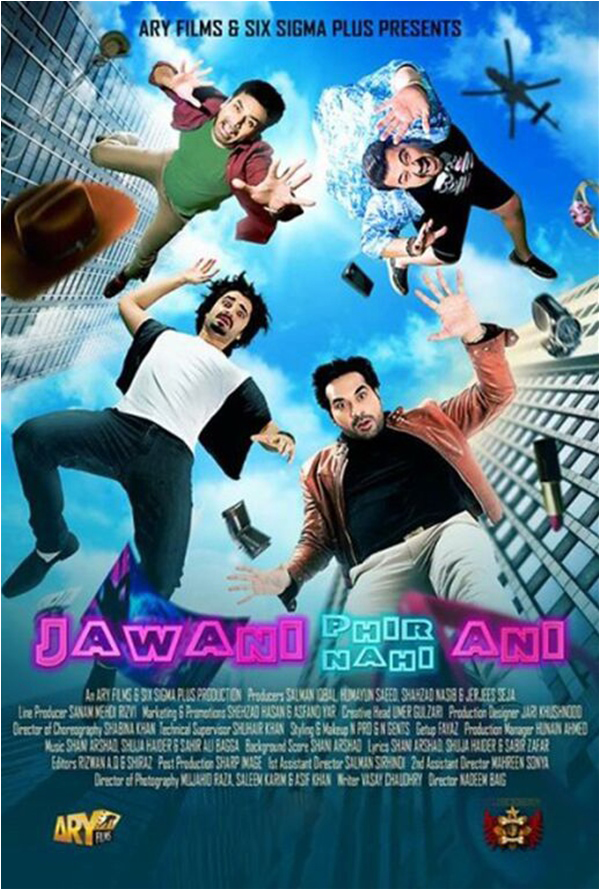
Are television broadcast rights and DVDs a source of revenue of film producers?
DVDs don’t make a lot of money in Pakistan. Television broadcast rights, at best, bring in about 10 million rupees. The two are not great sources of revenue.
And international exhibition?
This is actually a good source of revenue and one that can help our fledgling film industry a great deal. Bin Roye was profitable only because it did a lot of business internationally. The film’s domestic box office receipts would have left the producers in debt. Pakistani filmmakers need to make sure that our films are marketed and exhibited properly all over the world. This is necessary for the industry to grow, succeed and thrive.
Television and cinema in Pakistan seem to be attracting a lot of newcomers who do not exhibit the dedication, professionalism and devotion that actors were known for in the sixties, seventies and eighties.
Yes, they don’t. I have seen discipline, sincerity and loyalty erode, right before my eyes, over the years. Actors have become less committed to their craft and more interested in fame, fortune and celebrity. A number of actors today have become very difficult to work with.
Why has this happened?
Actors have been spoilt by the abundance of work available to them. We do not have enough actors in Pakistan. Today, successful actors get offers to do multiple serials simultaneously. They no longer care if they offend a producer or two because there will always be others who would gladly sign them on. In the beginning, PTV was the only game in town. If an actor misbehaved with a PTV producer, he would have had nowhere else to go to. This is no longer the case. The other issue is that actors have become bigger than directors and producers. Production houses and corporate sponsors tend to value actors more than writers, producers and directors. As a result, actors wield more power than others and find it easy to misbehave and act with arrogance.
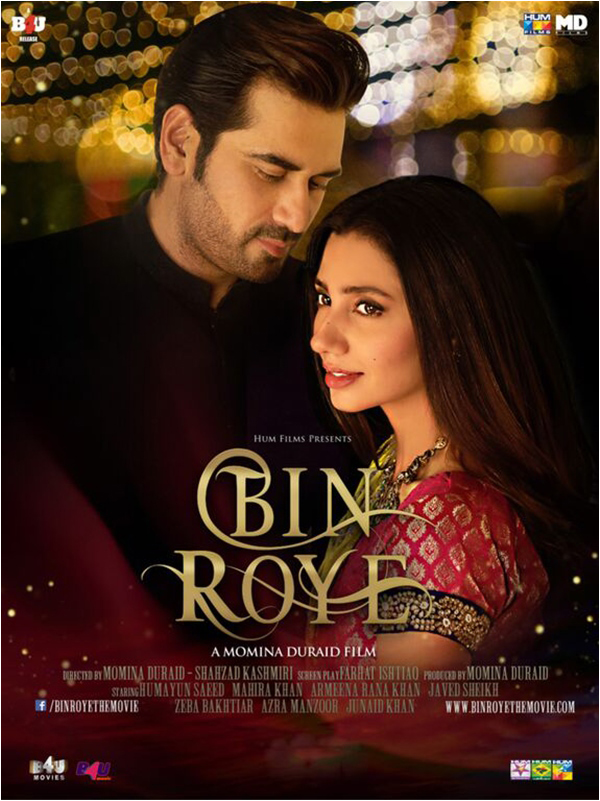
As a producer, how do you deal with the indiscipline?
I generally try to work with better and more responsible people and, therefore, have fewer problems. I also have a good rapport with a lot of young actors and try to guide them about the ways of the world, not just the industry. The abundance of work will not last. The scarcity of actors will go away. A bad reputation, on the other hand, will always stick with an actor and be impossibly difficult to repair.
Does the advice work?
It often does but there are times when I get very frustrated. We don’t have the legal mechanism, or even the culture in place to enforce discipline. I have often thought about taking a long road trip all across Pakistan, to discover new talent and audition people interested in acting. I might even make a reality show out of the road trip. If I do that, we will have scores of new actors and the ones who misbehave today will regret having forced me to recruit a whole new generation of actors. That being said, I do hope that as the industry continues to grow, actors will understand the benefits of professionalism and start conducting themselves more professionally.
Did Hamza Ali Abbasi give you a lot of grief during the shooting of Jawani Phir Nahi Ani?
Hamza is actually a very good young man. Once on set, he is responsible, mature and totally committed. He never throws tantrums. He shows up on time. And he acts very well.
But he did make things difficult….
Yes, he did. Several months after agreeing to do Jawani Phir Nahi Ani, he had a change of heart about doing romantic scenes with female actors. In fact, he asked me to drop him from the film but I was unable to do so. I had announced his name as one of the principal cast members to my financers and to the public. It would have hurt the film to let him leave the cast. I explained my predicament to him and he agreed to go along with the film but things became a little difficult for me after that point. Since I like and care for Hamza, I had to take his misgivings into consideration and try to minimize the number of scenes where he is seen romancing females. At the same time, I had to make sure that the integrity of the film was not compromised. Not the best of situations for a filmmaker, but one that I feel I handled well.
There are a lot of song and dance sequences in Jawani Phir Nahi Ani. Why did you chose a choreographer from India to direct these dances?
I believe that India has mastered the art of filming highly complex and intricately choreographed dance numbers. No one else in the world comes even close to the skills that Indians have in the area. We do have a few decent choreographers in Pakistan but none that know how to properly and efficiently film a dance number. I need someone who was good at both choreographing and filming dances and believe that I made a very good decision by having Shabina Khan choreograph the dances for Jawani Phir Nahi Ani. She worked with us both in Pakistan and in Thailand, and helped us complete shooting the songs in a remarkably short period of time. She was very good.
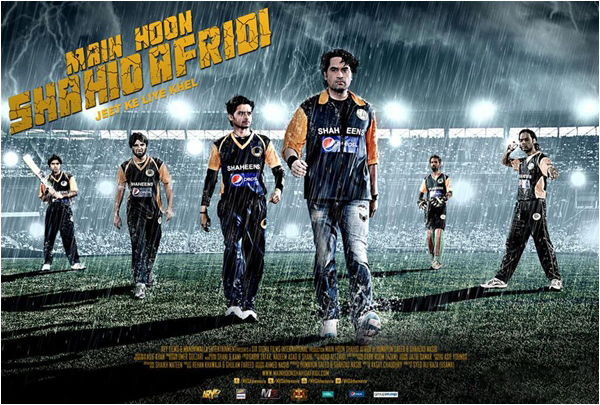
The small number of screens in Pakistan is a problem. Films are often taken off exhibition, even when they are drawing full houses, just to make room for new films. Have you thought about getting into the business of owning and running movie theaters?
This has been a dream of mine for a long time now. In fact, I wanted to build movie theaters even before I started producing movies. The plans have, unfortunately, not materialized yet, but I may get into the business in the future. Pakistan needs at least fifty new screens at this time.
A lot is being written and said about the rebirth of cinema in Pakistan. Do you feel that Pakistani cinema has arrived?
I think that there has been a marked improvement in Pakistani cinema. There is no doubt in my mind about that, but there is a long road ahead. We may actually be celebrating our success a little too soon. Our films still lack finesse. We are very weak in the area of story and screenplay writing. We do not have a lot of original ideas. We are unable to undertake big budget productions. The truth is that we are still in the learning stages as far as cinema goes, but we are learning well and we are learning fast.
A number of commercial Pakistani films imitate Bollywood. Jawani Phir Nahi Ani, however, is different. The humor, the set-up and the characters are distinctly Pakistani. Did you consciously decide not to make a film in Bollywood style?
Yes, I did. I wanted our film to have a local flavor. In fact, even though there are similarities between my film and the Hangover series, the film was not based on the series. I had the idea when I was at a party with a bunch of friends. We were talking about the control our wives had over us and how we wished to escape the control for a few days and go on a men-only vacation. That is how Jawani Phir Nahi Ani started.
Does your wife really exercise a lot of control over you?
Oh yes, she does. Fierce and total control. If I ever plan to make a trip with friends, she wants to come along with the kids. She promises to let me have all the time that I need alone with friends as long as she is accompanying us but I am smart enough to know that such promises are never honoured. She feels that I will misbehave and cheat if she is not around.
Is she wrong?
Yes.
Few wives know that men who wish to cheat can and will do so, right under their noses. Unfaithful husbands do not need to take overseas trips to cheat on their wives.
Speaking of which, you have a reputation for being a ladies’ man and quite the womanizer.
Yes, I do. I wish I deserved the reputation much more than I really do. I have been associated with a very large number of females during my career; unfortunately there have been far fewer romantic liaisons. There was a time when I used to run after girls and enjoyed having a large female fan following. I later understood that fans are in love with the image that they have of stars and not with the stars themselves. Infatuation is more at play than real romantic interest when fans interact with celebrities. As I have grown older, I have come to realize that getting recognition, respect and appreciation as an actor and as a filmmaker is more fulfilling than having a half-dozen girlfriends. I enjoy that more.
Jawani Phir Nahi Ani is unabashedly comedic, meant to entertain and amuse. Do you plan to continue with the genre?
I think my next few films are going to be entertaining and funny films. I may make an art film in the future but not at this time.
Do you like art films?
I like some art films but feel that a lot are over-rated. An art film is not necessarily better than a commercial film. A well-made film – be it a comedy, romance, science fiction or art – is a good film. The genre of a film does not determine its merit; the quality of filmmaking and fidelity to its genre is the correct measure of a film’s excellence.
Jawani Phir Nahi Ani has received some negative reviews.
Yes, it has. I tend to ignore them. I like constructive reviews: both positive and negative. There are some people who will find fault with anything and everything. I do not believe in taking their reviews seriously. When you go to see Superman, for instance, you should not complain about someone flying in the movie. When you see a Star Wars film, you don’t point out that such a world does not exist. Jawani Phir Nahi Ani is a light-hearted comedy and needs to be judged as such. I am aware of the weaknesses of my film – and there are quite a few – but am proud of the fact that it has made a lot of people laugh and enjoy themselves for three hours. This is no mean achievement.
I also think that the commercial success of the film will be good for the industry because after seeing its returns, investors and filmmakers will be encouraged to make expensive films on a large scale.
A lot of people say that you imitate Shahrukh Khan’s style.
Yes, they do, but they are wrong.
Do you think you look like Shahrukh Khan?
No, I don’t. Sahir Lodhi does.
Ally Adnan lives in Dallas and writes about culture, history and the arts. He tweets @allyadnan and can be reached atallyadnan@outlook.com.
Photographs by Ammar Sharif &
Yaseen Lakhani
I made the move because I love cinema. In fact, everyone who is making films in Pakistan today is doing so because of the passion they have for cinema and not to make money. Otherwise, there is more money and less risk in television.
Cinemas is, and has always been, my first love. When I started work on television, my plan was to move to films after doing a few serials. In fact, Sameena Peerzada cast me in her film, Inteha, after I had done just a couple of serials. The film was successful and garnered me a lot of praise but it was a bad time for Pakistani cinema. A lot of movie theaters were being shut down and the rest were in a state of disrepair. Very few films were being made. In spite of the success of my film, I did not get any offers to do good films. As a result, I continued working on television. Things started changing a few years later, when Pakistan decided to allow the exhibition of Indian films. This proved to be a boon for the film industry as it brought people back to the cinemas. As a result, a lot of new state-of-the-art movie theaters were constructed and a lot of educated and talented people started thinking about working in films. This rejuvenated environment was very heartening and I decided to make a film, Main Hoon Shahid Afridi, about the life of a cricketer. It was not a mainstream film but did very well at the box office.

Did you make a lot of money with Main Hoon Shahid Afridi?
No, I did not. The film was officially a commercial hit but I ended up losing money.
How come?
One, I had spent a lot of money on Main Hoon Shahid Afridi because I wanted to make a film of high quality. Two, the costs of marketing, promotion and exhibition are very high in Pakistan. A film has to make a lot of money at the box office for the producer to make a profit. Fortunately, I had a couple of corporate sponsors for the film. They helped me recover my costs.
How much business does a film need to do to make money for the producer?
A typical Pakistani film costs around 50 million rupees. It has to make about 150 million rupees for the producer to break even. Of course, the cost of the film affects these numbers. The higher the cost, the more money a film has to bring in for the producer to recover his investment.
Your second film as a producer, Jawani Phir Nahi Ani, has been a huge hit and gone on to become the highest grossing Pakistani film of all time. Has it been profitable for you?
Yes, it has been hugely profitable. The film cost about 90 million to make. Corporate sponsors pitched in about 30 million; so the net cost was about 60 million rupees. The film has done more than 400 million of business and continues to bring in money. I had expected it to make about 20 million rupees but I think it will end up raking in three times as much.

Are television broadcast rights and DVDs a source of revenue of film producers?
DVDs don’t make a lot of money in Pakistan. Television broadcast rights, at best, bring in about 10 million rupees. The two are not great sources of revenue.
And international exhibition?
This is actually a good source of revenue and one that can help our fledgling film industry a great deal. Bin Roye was profitable only because it did a lot of business internationally. The film’s domestic box office receipts would have left the producers in debt. Pakistani filmmakers need to make sure that our films are marketed and exhibited properly all over the world. This is necessary for the industry to grow, succeed and thrive.
Television and cinema in Pakistan seem to be attracting a lot of newcomers who do not exhibit the dedication, professionalism and devotion that actors were known for in the sixties, seventies and eighties.
Yes, they don’t. I have seen discipline, sincerity and loyalty erode, right before my eyes, over the years. Actors have become less committed to their craft and more interested in fame, fortune and celebrity. A number of actors today have become very difficult to work with.
Why has this happened?
Actors have been spoilt by the abundance of work available to them. We do not have enough actors in Pakistan. Today, successful actors get offers to do multiple serials simultaneously. They no longer care if they offend a producer or two because there will always be others who would gladly sign them on. In the beginning, PTV was the only game in town. If an actor misbehaved with a PTV producer, he would have had nowhere else to go to. This is no longer the case. The other issue is that actors have become bigger than directors and producers. Production houses and corporate sponsors tend to value actors more than writers, producers and directors. As a result, actors wield more power than others and find it easy to misbehave and act with arrogance.

As a producer, how do you deal with the indiscipline?
I generally try to work with better and more responsible people and, therefore, have fewer problems. I also have a good rapport with a lot of young actors and try to guide them about the ways of the world, not just the industry. The abundance of work will not last. The scarcity of actors will go away. A bad reputation, on the other hand, will always stick with an actor and be impossibly difficult to repair.
Does the advice work?
It often does but there are times when I get very frustrated. We don’t have the legal mechanism, or even the culture in place to enforce discipline. I have often thought about taking a long road trip all across Pakistan, to discover new talent and audition people interested in acting. I might even make a reality show out of the road trip. If I do that, we will have scores of new actors and the ones who misbehave today will regret having forced me to recruit a whole new generation of actors. That being said, I do hope that as the industry continues to grow, actors will understand the benefits of professionalism and start conducting themselves more professionally.
Did Hamza Ali Abbasi give you a lot of grief during the shooting of Jawani Phir Nahi Ani?
Hamza is actually a very good young man. Once on set, he is responsible, mature and totally committed. He never throws tantrums. He shows up on time. And he acts very well.
But he did make things difficult….
Yes, he did. Several months after agreeing to do Jawani Phir Nahi Ani, he had a change of heart about doing romantic scenes with female actors. In fact, he asked me to drop him from the film but I was unable to do so. I had announced his name as one of the principal cast members to my financers and to the public. It would have hurt the film to let him leave the cast. I explained my predicament to him and he agreed to go along with the film but things became a little difficult for me after that point. Since I like and care for Hamza, I had to take his misgivings into consideration and try to minimize the number of scenes where he is seen romancing females. At the same time, I had to make sure that the integrity of the film was not compromised. Not the best of situations for a filmmaker, but one that I feel I handled well.
There are a lot of song and dance sequences in Jawani Phir Nahi Ani. Why did you chose a choreographer from India to direct these dances?
I believe that India has mastered the art of filming highly complex and intricately choreographed dance numbers. No one else in the world comes even close to the skills that Indians have in the area. We do have a few decent choreographers in Pakistan but none that know how to properly and efficiently film a dance number. I need someone who was good at both choreographing and filming dances and believe that I made a very good decision by having Shabina Khan choreograph the dances for Jawani Phir Nahi Ani. She worked with us both in Pakistan and in Thailand, and helped us complete shooting the songs in a remarkably short period of time. She was very good.

The small number of screens in Pakistan is a problem. Films are often taken off exhibition, even when they are drawing full houses, just to make room for new films. Have you thought about getting into the business of owning and running movie theaters?
This has been a dream of mine for a long time now. In fact, I wanted to build movie theaters even before I started producing movies. The plans have, unfortunately, not materialized yet, but I may get into the business in the future. Pakistan needs at least fifty new screens at this time.
A lot is being written and said about the rebirth of cinema in Pakistan. Do you feel that Pakistani cinema has arrived?
I think that there has been a marked improvement in Pakistani cinema. There is no doubt in my mind about that, but there is a long road ahead. We may actually be celebrating our success a little too soon. Our films still lack finesse. We are very weak in the area of story and screenplay writing. We do not have a lot of original ideas. We are unable to undertake big budget productions. The truth is that we are still in the learning stages as far as cinema goes, but we are learning well and we are learning fast.
A number of commercial Pakistani films imitate Bollywood. Jawani Phir Nahi Ani, however, is different. The humor, the set-up and the characters are distinctly Pakistani. Did you consciously decide not to make a film in Bollywood style?
Yes, I did. I wanted our film to have a local flavor. In fact, even though there are similarities between my film and the Hangover series, the film was not based on the series. I had the idea when I was at a party with a bunch of friends. We were talking about the control our wives had over us and how we wished to escape the control for a few days and go on a men-only vacation. That is how Jawani Phir Nahi Ani started.
Does your wife really exercise a lot of control over you?
Oh yes, she does. Fierce and total control. If I ever plan to make a trip with friends, she wants to come along with the kids. She promises to let me have all the time that I need alone with friends as long as she is accompanying us but I am smart enough to know that such promises are never honoured. She feels that I will misbehave and cheat if she is not around.
Is she wrong?
Yes.
Few wives know that men who wish to cheat can and will do so, right under their noses. Unfaithful husbands do not need to take overseas trips to cheat on their wives.
Speaking of which, you have a reputation for being a ladies’ man and quite the womanizer.
Yes, I do. I wish I deserved the reputation much more than I really do. I have been associated with a very large number of females during my career; unfortunately there have been far fewer romantic liaisons. There was a time when I used to run after girls and enjoyed having a large female fan following. I later understood that fans are in love with the image that they have of stars and not with the stars themselves. Infatuation is more at play than real romantic interest when fans interact with celebrities. As I have grown older, I have come to realize that getting recognition, respect and appreciation as an actor and as a filmmaker is more fulfilling than having a half-dozen girlfriends. I enjoy that more.
Jawani Phir Nahi Ani is unabashedly comedic, meant to entertain and amuse. Do you plan to continue with the genre?
I think my next few films are going to be entertaining and funny films. I may make an art film in the future but not at this time.
Do you like art films?
I like some art films but feel that a lot are over-rated. An art film is not necessarily better than a commercial film. A well-made film – be it a comedy, romance, science fiction or art – is a good film. The genre of a film does not determine its merit; the quality of filmmaking and fidelity to its genre is the correct measure of a film’s excellence.
Jawani Phir Nahi Ani has received some negative reviews.
Yes, it has. I tend to ignore them. I like constructive reviews: both positive and negative. There are some people who will find fault with anything and everything. I do not believe in taking their reviews seriously. When you go to see Superman, for instance, you should not complain about someone flying in the movie. When you see a Star Wars film, you don’t point out that such a world does not exist. Jawani Phir Nahi Ani is a light-hearted comedy and needs to be judged as such. I am aware of the weaknesses of my film – and there are quite a few – but am proud of the fact that it has made a lot of people laugh and enjoy themselves for three hours. This is no mean achievement.
I also think that the commercial success of the film will be good for the industry because after seeing its returns, investors and filmmakers will be encouraged to make expensive films on a large scale.
A lot of people say that you imitate Shahrukh Khan’s style.
Yes, they do, but they are wrong.
Do you think you look like Shahrukh Khan?
No, I don’t. Sahir Lodhi does.
Ally Adnan lives in Dallas and writes about culture, history and the arts. He tweets @allyadnan and can be reached atallyadnan@outlook.com.
Photographs by Ammar Sharif &
Yaseen Lakhani

